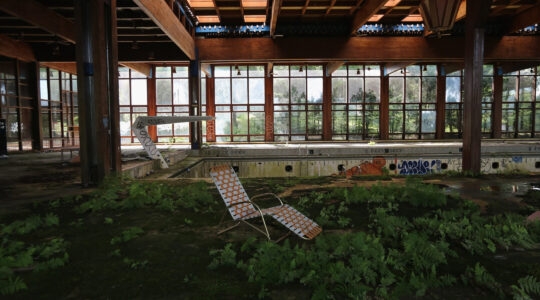The underlying tension between the Israeli government sponsors of last week’s Jewish Media Summit in Jerusalem and many of the 140 attendees — Jewish journalists from 32 countries — rose to the surface at the very first panel of the four-day program.
The theme of the conference, whose primary sponsors were the Government Press Office, the Ministry of Foreign Affairs and the Ministry of Diaspora Affairs, was “The Challenges of Reporting on Israel and the Jewish World.” Government officials, starting with Prime Minister Benjamin Netanyahu and including Minister of Economy and Diaspora Affairs Naftali Bennett, outgoing President Shimon Peres and President-elect Reuven Rivlin, urged the journalists to help make Israel’s case to a largely biased and hostile world.
At the opening session, Netanyahu exhorted us to report on increasing anti-Semitism in Europe; the dangers of the planned agreement between the U.S. and Iran on its nuclear program and Israel’s new plan to launch a major initiative to bolster Jewish identity in diaspora communities, particularly focused on young people.
In truth, a number us have been reporting and editorializing on these issues, and there was a sense in the audience that we were being treated more like public relations operatives than journalists.
The next morning one of my colleagues, Jennifer Frazer, an editor of the London Jewish Chronicle, drew applause at the opening panel when, in response to the prime minister’s message to us the night before, she asserted that Netanyahu “was brought here [to deliver] platitudes.
“We need the Israelis to take us seriously,” she said.
Her frustration was echoed by fellow panelists Henrique Cymerman, who covers the Mideast and international affairs from Israel; Marshall Weiss, the president of the American Jewish Press Association and me. We argued that it is a mistake for Israeli officials to take Jewish media and diaspora support for granted, and to ignore in their presentations controversial issues like the settlements, the occupation and the failed peace talks.
Similarly, at a session entitled “Israel’s Image Problem” on the last day of the conference, panelist Sue Fishkoff, editor of j, the Jewish weekly in San Francisco, noted what she called “a profound misunderstanding” on the part of the conference organizers in terms of the relationship between the Israeli government and Jewish media.
“Don’t feed us pap,” she told the government representatives, adding that it is not the job of journalists to promote Israel’s image. No one on the panel contested her remarks.
While the organizers may have seen the conference primarily as an opportunity to make Israel’s case to Jewish media, a number of us had hoped it would help strengthen the ties between world Jewry and Jerusalem, and among Jewish journalists in Israel and around the world.
Clearly those were among the goals of the summit, the first major effort to bring Jewish journalists from around the world together in Israel in 14 years. The organizers deserve much credit for making it happen, subsidizing a major part of our expenses and backing our suggestion to create an international association of Jewish journalists.
The program included detailed, thoughtful presentations from Israeli political, military and intelligence officials, and field trips to the Gaza border, Jewish communities in the West Bank and programs incorporating pluralism into Jewish education and culture; it also included visits to successful start-up companies.
But there was no time built into the schedule to allow the participants to get to know each other and discuss and compare the challenges they face in their communities. (Judging from questions posed at the sessions, the French journalists were deeply concerned about growing anti-Semitism at home and the lack of attention to it elsewhere.) And compounding the problem, there were no translators on hand — all sessions were in English — and many of the journalists from Eastern Europe and South America felt out of touch.
Nitzan Chen, who heads the Government Press Office and led the effort to launch the summit, acknowledged these concerns and pledged to address them at the next summit, which he hopes will take place in two years.
In the meantime, a couple of enterprising American participants arranged for a late-night meeting with several of the journalists from Ukraine, and the conference provided a Russian translator. The meeting, attended by about a dozen people, lasted for several hours, during which the Ukrainians described the history and context of the local Jewish communities as well as their personal observations about the current crisis with Russia.
Neglecting Diaspora Jewry
One theme that ran through the conference was the striking imbalance between diaspora Jewry’s intense coverage of Israel and the Israeli media’s lack of interest in world Jewry beyond anti-Semitism and political support for Jerusalem.
Israeli journalists said their editors could care less about stories dealing with diaspora Jewish life. As one Israeli reporter put it bluntly, “You love us more than we love you.”
That’s why one of the key findings of a new study on Israeli views of diaspora Jewry, conducted by the Israel Democracy Institute, came as a surprise to many. It found that 81 percent of Israeli Jews are interested in diaspora Jewry. But it was difficult to determine what to make of several seemingly contradictory results. One is that 62 percent of Israelis believe that Jews in Israel and the diaspora share a common fate, and another revealed that 60 percent of Israeli Jews believe that Israel is a nation separate from diaspora Jewry.
In the end the summit implicitly highlighted the communal tensions we Jewish journalists deal with on a daily basis. For example, we tend to feel under-appreciated in our own communities. If we ignore controversial issues for fear of alienating readers we are considered spineless; but if we take those issues on we are often the targets of criticism for embarrassing the community. Similarly, if we write critically of Israeli policies on occasion we are accused of being insufficiently supportive of the Zionist cause.
In the case of Israel, a source of ongoing debate is just how much of the problem lies with the journalist and how much with the actual policies or hasbarah efforts emanating from Jerusalem. But it was hardly discussed at the conference.
On occasion Israeli officials in Jerusalem and New York have shared with me their frustration with the mixed and often contradictory messages their government sends out, like announcing new settlement expansion during the visit of American officials. The officials insist that a more focused and sophisticated approach emanating from the foreign ministry or prime minister’s office could alleviate some of the international criticism Israel receives. Instead, Israel is still perceived by many as the oppressor rather than victim in its ongoing conflict with the Palestinians.
With the summit taking place during the search for the three kidnapped Israeli teenagers, whose tragic fate was then unknown, a shadow hovered over the proceedings, as well as over much of the country. It seemed to me that as much as we journalists were insisting on our independence and sense of professionalism as objective observers, we needed to recognize our own strong ties to Israel and the Jewish people, and not be ashamed of that fact.
When one of my co-panelists said she defined herself as a journalist first and a Jew second, I disagreed, suggesting that we need not separate the two. I still believe that at least on a good day, when we are doing our jobs properly, we are striving for the same goal of bettering the world.
The New York Jewish Week brings you the stories behind the headlines, keeping you connected to Jewish life in New York. Help sustain the reporting you trust by donating today.





